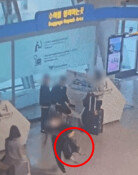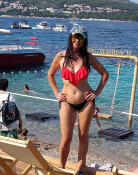A-bomb: past and present
A-bomb: past and present
Posted September. 12, 2016 06:51,
Updated September. 12, 2016 07:09
Han Soo-san's novel "The Warship" is about Korean draftees taken to Hashima, a Mitsubishi-owned island in the Japanese prefecture of Nagasaki at the end of the colonial rule. The colonial Japan called them “people who were happily drafted.” However, they had to work more than 12 hours a day in temperatures over 30 degrees Celsius at the underwater mine. Some draftees risked their lives to escape the “hellish island.”
However, the Fat Man, an atomic bomb, was waiting for them who went to the dockyard and the weapons workshop of Mitsubishi Material in Nagasaki. Rumors spread to Nagasaki that a new unknown bomb was dropped in Hiroshima on Aug. 6, 1945, devastating the region. Three days later, the U.S. Forces moved to drop the Fat Man in Kokura in the north of Nagasaki. Surprised by an air-raid siren, some Japanese are said to have burnt coal tar. B29, which failed to witness where to drop the bomb, turned its nose to Nagasaki.
The Fat Man was made of a fire ball of 300,000 degrees Celsius with a diameter of 15 meters. The temperature of the boiled land was 3,000 to 4,000 degrees Celsius. Those within four kilometers from the center of the bombed area evaporated or their cloth and skin melt down. Thirsty and blood-bathed people with injury wandered around to find water with their arms raised so that their body do not get stuck. Han Soo-san said his wife and daughter who translated Japanese archives on those injured by the bomb said, "I can’t do this anymore. I can’t eat anything.” Some 70,000 people died in Nagasaki in the year, and around 20,000 were Koreans. Japanese rescue teams rushed to the injured Japanese, not to Koreans.
Some of the draftees rescued the injured and cleaned up the dead bodies. Han Soo-san says he tried to depict characteristics of human natures. North Korea’s recent fifth nuclear test has made it necessary for South Korea to work with Japan, as much as it does with the U.S. It could be seen as an irony of history to cooperate with Japan against North Korea’s nuclear threats. But now seems to be the time for the world to hold hand in hand and show what human beings should be like.
이 진 논설위원 leej@donga.com







